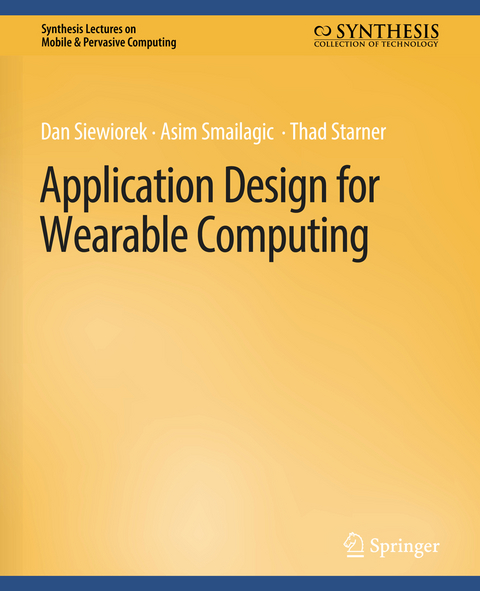
Application Design for Wearable Computing
Springer International Publishing (Verlag)
978-3-031-01348-5 (ISBN)
Daniel P. Siewiorek received his bachelor of science degree in electrical engineering from the University of Michigan, Ann Arbor, in 1968 and his master of science and doctor of philosophy degrees in electrical engineering, with a minor in computer science, from Stanford University in 1969 and 1972, respectively. Dr. Siewiorek is the Buhl University professor of electrical and computer engineering and computer science at Carnegie Mellon University. He has designed and been involved with the design of nine multiprocessor systems and has been a key contributor to the dependability design of more than two dozen commercial computing systems. Dr. Siewiorek leads an interdisciplinary team that has designed and constructed more than 20 generations of mobile computing systems. He has written eight textbooks in the areas of parallel processing, computer architecture, reliable computing, and design automation in addition to more than 475 papers. Currently director of the Human Computer Interaction Institute, he was previously director of the Engineering Design Research Center and cofounder of its successor organization, the Institute for Complex Engineered Systems, where he served as associate director. He has been the recipient of the American Association of Engineering Education Frederick Emmons Terman Award, the IEEE/ACM Eckert-Mauchly Award, and the ACM SIGMOBILE Outstanding Contributions Award. He is a fellow of IEEE, ACM, and AAAS and a member of the National Academy of Engineering. Asim Smailagic is a research professor in the Institute for Complex Engineered Systems, College of Engineering, and Department of Electrical and Computer Engineering at Carnegie Mellon University (CMU). He is also the director of the Laboratory for Interactive and Wearable Computer Systems at CMU, which has designed and built more than two dozen generations of novel wearable computers during the last 15 years and several prototypes of context-aware computer systems. Dr. Smailagic received the Fulbright Postdoctoral Award in Computer Science at CMU in 1988. He has been a program chairman or cochairman of IEEE conferences more than 10 times. He is chair of the IEEE Technical Committee on Wearable Information Systems. He codeveloped an interdisciplinary concurrent design methodology with Dr. Dan Siewiorek and is widely recognized for his work in the design and rapid prototyping of wearable computers. Dr. Smailagic received the 2000 Allen Newell Award for Research Excellence from CMU School of Computer Science, the 2003 Carnegie Science Center Award for Excellence in Information Technology, the 2003 Steve Fenves Systems Research Award from the CMU College of Engineering, and other awards. Dr. Smailagic has written or edited books in the areas of mobile computing, digital system design, field programmable gate arrays, and VLSI systems. He gave keynote lectures at many representative international conferences and at institutions such as the Royal Academy of Engineering, London, UK. Prof. Smailagic participated in several major research projects that represent milestones in the evolution of computer system architectures: from CMU's Cm* Multiprocessor System and Edinburgh Multi-Microprocessor Assembly (EMMA) to CMU's parallel and distributed computer systems, to the current projects on Wearable Computer Systems, Smart Modules computers, Aura Pervasive Computing, Context Aware Computing, Cognitive Computing, Virtual Coaches, and Quality of Life Technologies. Thad Starner is the founder and director of the Contextual Computing Group at Georgia Institute of Technology's College of Computing. Before joining the Georgia Tech faculty in 1999, Starner gained international recognition at the MIT Media Laboratory as one of the worldaEURO (TM)s leading experts on wearable computers during his doctoral work "Wearable Computing and Contextual Awareness." An advocate of continuous-access, everyday-use systems, Starner has worn his custom wearable computer in such a manner since 1993, arguably the longest such experience. Starner is a cofounder of the IEEE International Symposium on Wearable Computers (ISWC) and cofounder and first member of the MIT Wearable Computing Project. In 1999, Starner was named one of Technology Reviews TR100 individuals under 35 who exemplify the spirit of innovation. Starner has been a keynote speaker and/or distinguished lecturer at a wide range of scientific, industrial, and academic events, including ACM's Conference for Advances in Computer Entertainment (ACE), Princeton's Distinguished Lecture in Pervasive Computing, the International Conference on Robotics and Automation (ICRA), Fashion Institute of Technology's Faculty Convocation, Interaction, Nicograph, Second Congreso Internacional de Ingenieria Electronica, and Interaction homme-Machine (IhM). His work has been discussed in national and international public forums, including CBS's 60 Minutes and 48 Hours, The New York Times, New Scientist, Nikkei Science, ABC's Nightline and World News Tonight with Peter Jennings, The London Independent, The Bangkok Post, PBS's Scientific American Frontiers, CNN, BBC, and The Wall Street Journal. Starner has authored well over 100 scientific articles and book chapters and is always looking for a good game of table tennis.
Introduction.- The Wearable Computing UCAMP.- Design Guidelines for Wearable Computing.- Research Directions.- Conclusions and Future Challenges.
| Erscheinungsdatum | 06.06.2022 |
|---|---|
| Reihe/Serie | Synthesis Lectures on Mobile & Pervasive Computing |
| Zusatzinfo | VI, 70 p. |
| Verlagsort | Cham |
| Sprache | englisch |
| Maße | 191 x 235 mm |
| Gewicht | 161 g |
| Themenwelt | Informatik ► Software Entwicklung ► Mobile- / App-Entwicklung |
| Mathematik / Informatik ► Mathematik | |
| Technik | |
| ISBN-10 | 3-031-01348-4 / 3031013484 |
| ISBN-13 | 978-3-031-01348-5 / 9783031013485 |
| Zustand | Neuware |
| Informationen gemäß Produktsicherheitsverordnung (GPSR) | |
| Haben Sie eine Frage zum Produkt? |
aus dem Bereich


